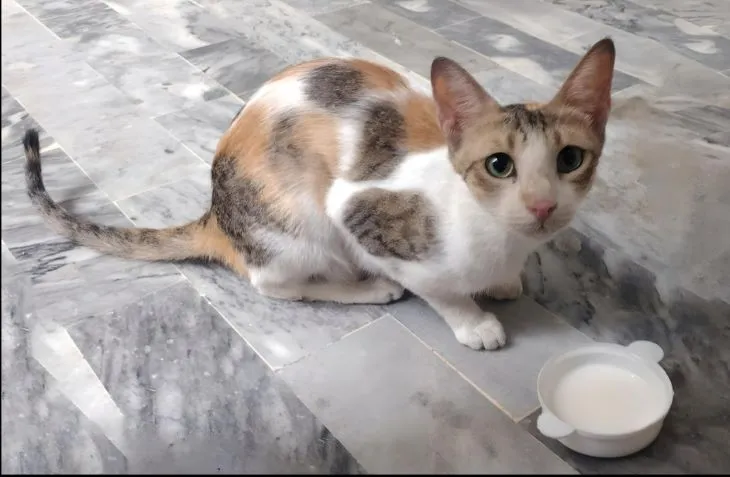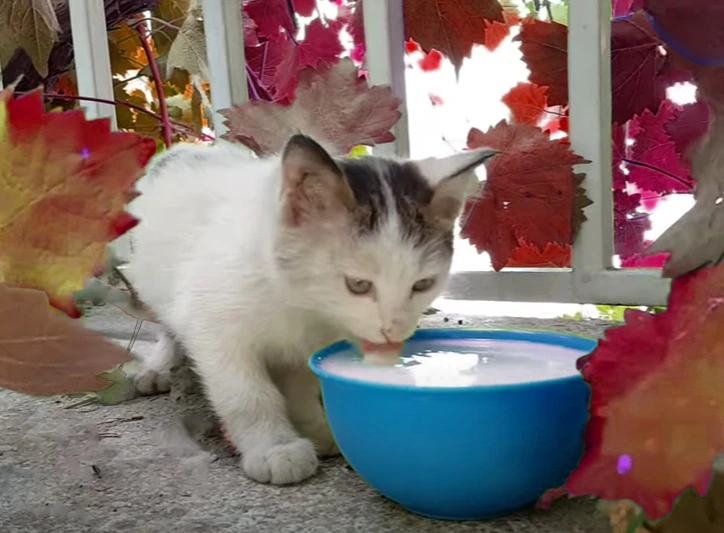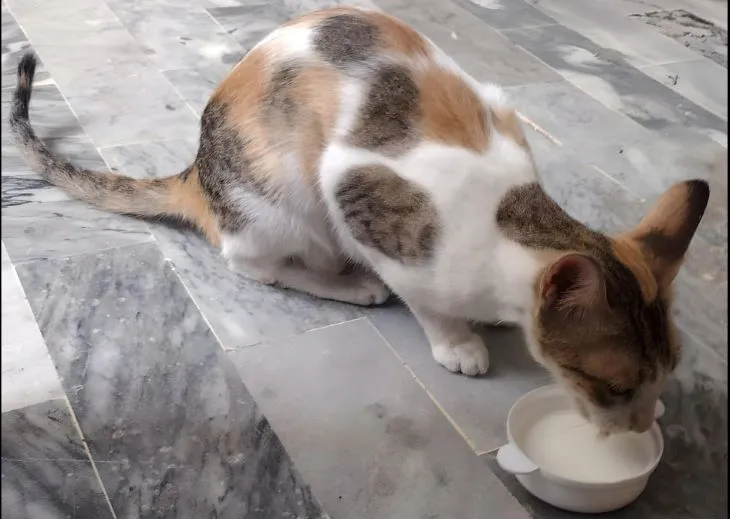Can Cats Drink Milk? The Answer Is Generally No
Most cats are Lactose Intolerant, meaning regular milk leads to vomiting, diarrhea, and stomach pains. Still, water remains the ideal healthy drink for cats.
By: Lana Koh

The information in this article is intended to educate cat parents and is not a substitute for veterinary guidance. In case of any concerns about your cat’s health, please talk with your veterinarian.
The image of a cat drinking milk is iconic. For years, cartoons and media have depicted cats happily lapping up a bowl of milk, leaving many pet owners to believe it’s a nutritious treat. However, the reality isn’t quite so simple. As a cat lover and breeder with over ten years of experience, I’ve seen first-hand that milk can cause digestive upset in many cats.
In this article, I’ll share everything you need to know about whether cats can drink milk safely, the risks involved, and the best ways to support their health.
Can Cats Drink Milk?
Technically, cats can drink milk, but generally speaking, it is not good for most cats. The milk sugar, called lactose, passes through the cat’s gut without being digested. The unused lactose can make cats sick, causing diarrhea and vomiting.
Is Milk Safe For Cats?
Cats often love the taste of milk, but the question remains: is it truly safe? For most adult cats, the answer leans towards “No” due to a common condition called lactose intolerance. Let’s explore why most cats are sensitive to milk and what happens if they consume it.
Related Article: Can Cats Eat Cheese?
Why Are Cats Lactose Intolerant?
Most adult cats are lactose intolerant, meaning they lack the enzyme lactase needed to digest lactose, the sugar in milk. As kittens, cats produce lactase to break down their mother’s milk, but as they mature, lactase production decreases. Without enough lactase, drinking milk can lead to several digestive issues, making milk more harmful than helpful.
Symptoms Of Lactose Intolerance In Cats
When lactose-intolerant cats consume milk, they may experience symptoms like:
- Diarrhea: Loose, watery stools are a common sign.
- Vomiting: Some cats may vomit soon after drinking milk.
- Bloating and Gas: Undigested lactose ferments in the gut, causing discomfort.
- Stomach Cramps: Indigestion from lactose can lead to abdominal pain.
If you’re unsure if your cat is lactose intolerant, it’s best to avoid milk altogether or consult your vet for advice.
Related Article: Can Cats Eat Tortillas?
Are There Any Benefits Of Milk For Cats?
Although milk offers minimal nutritional value for adult cats, some pet owners still wonder if there’s any benefit to offering it as an occasional treat. Here’s what you need to know about milk’s nutrients and safer ways to provide similar benefits.
How To Offer Milk Safely (Lactose-Free Options)
For cats that enjoy the taste of milk, there are lactose-free options designed specifically for cats. These milk alternatives have removed the lactose, making them gentler in feline digestive systems. You can offer small amounts as a treat, but remember that water should always be their primary source of hydration.
Special Cat Milk Treats
Several pet brands offer milk treats for cats, which can be a safe way to satisfy their craving. These products are specifically formulated to be gentle on a cat’s digestive system, and some even contain added nutrients. Still, it’s essential to check the ingredients and avoid any added sugars or artificial flavors.
Click to learn: Can Cats Eat Dragon Fruit?
Can Kittens Drink Milk?
Kittens rely on their mother’s milk for proper nutrition in their early weeks. However, if a kitten is separated from its mother or needs supplemental feeding, it’s best to use a kitten-specific milk formula rather than cow’s milk.
The Best Milk For Orphaned Kittens
Kitten milk replacer (KMR) provides a balanced alternative that replicates the nutritional content of mother’s milk, without the lactose that could cause digestive upset. KMR contains the essential nutrients, vitamins, and fats kittens need to grow and develop.
Click to learn: How to litter train a kitten?
The Risks Of Giving Regular Milk To Cats

Milk might seem like a harmless treat, but for most cats, it can lead to more harm than good.
Digestive Issues And Lactose
Regular milk consumption can lead to discomfort and digestive upset for many cats. Symptoms like diarrhea and bloating not only affect the cat but can also be a burden on pet owners who have to manage the mess. If your cat loves milk, opt for small, controlled amounts of lactose-free alternatives rather than regular milk.
Interesting read: How to stop a cat from crying at night?
Potential For Allergic Reactions
While lactose intolerance is more common, some cats may have a milk allergy. Symptoms can range from skin rashes and itching to gastrointestinal distress. If you notice any unusual signs after your cat consumes milk, consult your veterinarian to rule out allergies.
High-Calorie Concerns
Milk is high in calories compared to other treats, which can contribute to unwanted weight gain if given frequently. Excess calories can lead to obesity, which puts cats at risk for diabetes, arthritis, and other health issues. Treat milk as an occasional snack rather than a dietary staple.
Healthy Alternatives To Milk For Cats
If your cat enjoys the taste of milk, there are healthier, lower-risk options available.
Lactose-Free Cat Milk
Several pet food companies produce lactose-free milk specifically designed for cats. These options retain the taste cats love but without the lactose that can cause discomfort. Always read the label to ensure there are no added sugars or preservatives.
Water with a Twist
Encouraging proper hydration is essential for cats, as they are prone to urinary and kidney issues. To make drinking water more appealing, try adding a splash of low-sodium chicken broth or a few drops of tuna juice.
High-Moisture Cat Food
Canned cat food contains higher moisture content, which helps with hydration and adds variety to your cat’s diet. Many cats prefer the taste and texture of wet food, and the moisture can aid in digestion.
Practical Feeding Tips For Milk And Milk Alternatives

If you decide to give milk or a milk alternative to your cat, follow these guidelines to ensure their health and safety:
- Start Small: Introduce milk in tiny amounts and monitor your cat for any signs of digestive upset.
- Limit Frequency: Milk should not be a daily treat. Offering it once a week in moderation is ideal.
- Watch for Symptoms: If you observe diarrhea, vomiting, or changes in appetite, discontinue milk immediately.
- Choose Cat-Safe Options: Opt for specially formulated cat milk rather than regular milk to reduce the risk of lactose intolerance.
- Prioritize Hydration: Always provide fresh water as the main source of hydration, especially if you decide to treat your cat with occasional milk.
Frequently Asked Questions
Final Thoughts: Prioritizing Your Cat’s Health
While milk may seem like a tasty treat, it’s not the best choice for most cats. Cats are obligate carnivores and thrive on a diet rich in animal proteins and low in carbohydrates. For hydration and occasional treats, stick to water, wet food, and cat-safe lactose-free options to keep your cat happy and healthy. Always consult your veterinarian before introducing new foods, including milk, to ensure it align with your cat’s dietary needs.

About the Author
Lana Koh
Lana is a passionate cat lover with years of experience caring for her feline companions. As a dedicated volunteer at animal shelters, she’s gained valuable insights into the world of cats. Lana channels her love and knowledge into writing informative and engaging articles for fellow pet owners, covering topics like cat health, nutrition, grooming, behavior, and the special bond we share with our feline friends.
